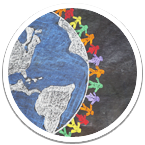Promoting the mental health of migrants

Mental health can be promoted in many ways. The objective of mental health promotion is to increase the factors that strengthen and protect mental wellbeing. Mental health can be promoted both at the individual and societal level, and this work can be done together with others.
Increasing equality promotes mental health
Factors that promote the mental health of migrants are the same as those which promote the mental health of the entire population. These include a safe living environment, experiences of inclusion and the opportunity to work or study. Studies show that migrants face more challenges in these areas than the rest of the population.
At the societal level, promoting the mental health of migrants involves
- tackling racism and discriminatory structures
- promoting employment and ensuring sufficient income
- increasing people’s opportunities to influence their own lives
- promoting inclusion.
Equality issues must also be taken into account when promoting the mental health of migrants. Among other things, equality means that all people in our society should have equal opportunities to receive and use services. Working with the assistance of an interpreter, for example, can facilitate greater equality in service provision.
Equality and discrimination (Integration and inclusion website)
Mental health-promoting work approach
A mental health-promoting work approach is one in which the professional seeks to increase and strengthen the individual’s personal resources to protect and strengthen their mental health.
When we talk of mental health, it is easy to focus on problems and symptoms, or to be afraid to raise the topic. Sometimes the topic has negative associations. Through their own actions, a professional can predictand correct such negative perceptions: they can speak about mental health as a positive resource that is part of overall health and wellbeing.
An individual’s own ability to promote their mental health can be increased, for example, by providing psychoeducation. Psychoeducation is the sharing of information about mental health and the factors that affect it.
Psychoeduaction
In addition to sharing information, a central part of work to promote mental health is to respectfully engage with the customer as an individual and, in particular when working with migrants, to have a culturally sensitive work approach. Cultural sensitivity involves taking into account and respecting different individual, linguistic and cultural factors in the interaction between the professional and the customer.
Cultural competence and cultural sensitivity (Support material webpage)
More information on an expert video
In an expert video, psychologist Katja Cilenti presents various refugees' resource and risk factors. The video is part of the PALOMA Training.




